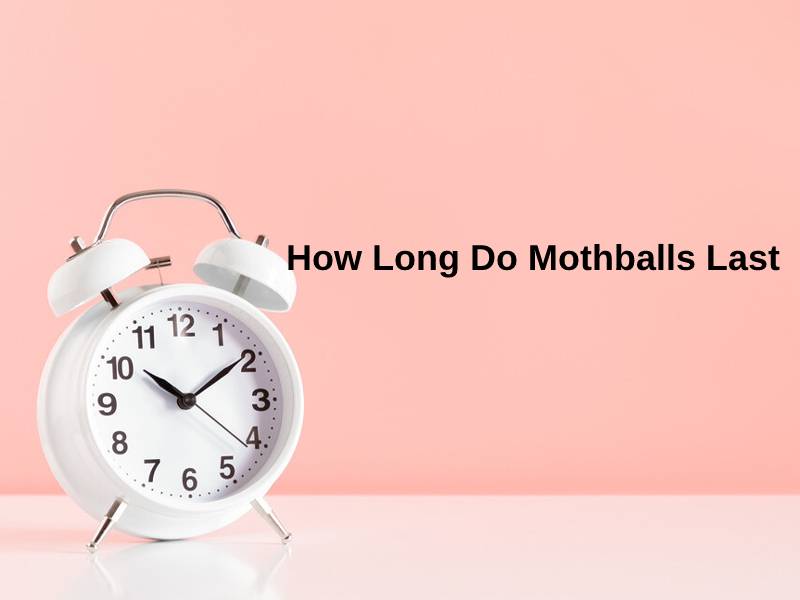Exact Answer: 2 to 6 months
Mothballs are an excellent way to protect your clothes, blankets, sleeping bags, and anything else from moth larvae or mold damage. They’re little deodorant and pesticide balls that help to keep your stuff clean and safe.
The Environmental Protection Agency regulates them in the United States. Any pesticide, including mothballs, has a label that outlines where and how it can be used legally. Not only is it illegal to use mothballs in ways not mentioned on the label, but it can also be harmful to people, pets, and the environment.
Mothballs are commonly utilized in areas to manage pests other than clothing moths. Squirrels, muskrats, deer, rodents, mice, puppies, cats, raccoons, foxes, reptiles, birds, and a wide range of other species are among them.

How Long Do Mothballs Last?
| Condition | Lasts for |
| Average mothball | 2 to 6 months |
Chemicals are used to make mothballs. At room temperature, this chemical dissolves and transforms into a gas that enters the atmosphere. The rate at which a mothball evaporates is entirely dependent on the temperature and other factors. More humid and hotter conditions cause mothballs to evaporate faster, while colder temperatures cause them to evaporate slower.
You’ll know it’s time to replace your mothballs when they’ve disappeared. Mothballs can endure anywhere from two months to a year in most cases. If you use mothballs in an indoor place like your basement, attic, or the inside of a shed, they’ll leave a pretty unpleasant odor once they’ve decomposed. This can be rather inconvenient.
It is not recommended that you use any type of air freshener to neutralize the odor. Mothballs release gas into the atmosphere when they decompose. You don’t want this chemical to combine with the air freshener’s chemicals. If inhaled, it could be harmful. Second, by combining two odors, you’ll almost certainly generate a new odor that isn’t so pleasant.
The remedy is to use a scentless neutralizer to get rid of the odor in your location. Instead of just masking the odor of the mothballs, a good neutralizer will eliminate it. Another effective option is to just open the windows and let the odor go. Additionally, the use of fans and air purification devices may be beneficial.
Why Does Mothballs Last For So Long?
Naphthalene, or paradichlorobenzene chemicals, both of which are harmful to humans, are widely used in mothballs. Both of these compounds are necessary for a mothball’s design and effectiveness. These compounds are solids at room temperature and are formed into spherical balls, flakes, or cakes, which slowly decompose into gas and emit odors into the atmosphere.
Always store mothballs in airtight bags and containers. Because mothballs evaporate into a gas that is extremely harmful to your health, they should never be placed at random. You can keep the harmful fumes from escaping and causing unnecessary health problems by putting them in airtight containers or plastic bags.
If you accidentally placed mothballs in a container with clothes, you should wash them with vinegar before wearing them again. You could make yourself sick if you don’t do this. It’s vital to remember that you shouldn’t dry your garments until the mothball odor has gone away. Otherwise, the stink will linger indefinitely.
When working with mothballs, always use rubber gloves. This will prevent you from rubbing the chemicals into your eyes or mouth unintentionally. Some others even wear face masks to avoid breathing the odors. Make sure you take measures and follow the instructions on the label of the mothball box you bought.
Conclusion
Mothballs are a popular and effective sort of repellant for moths. Natural remedies with a cedar aroma, for example, are good alternatives to mothballs. Because they are chemical-free, you can put them in your closet or other chosen location without having to store them in an airtight container, resulting in a wider range of aroma.
It’s essential to store your mothballs not only in an airtight bag or container but also in a location where children and dogs cannot access them. Locked outbuildings, high-up cabinets, and even lockboxes are all suitable places to store extra mothballs.




















